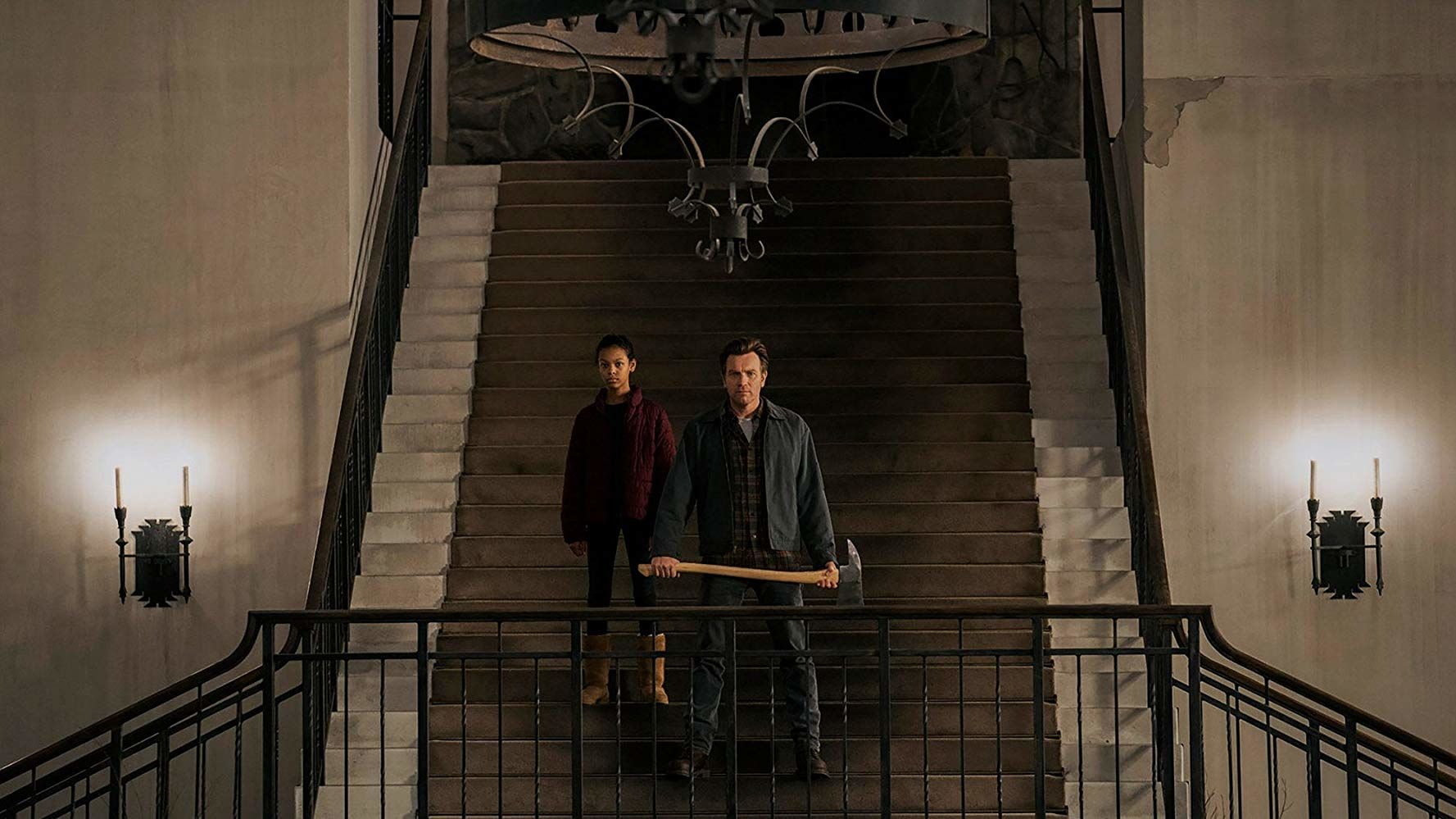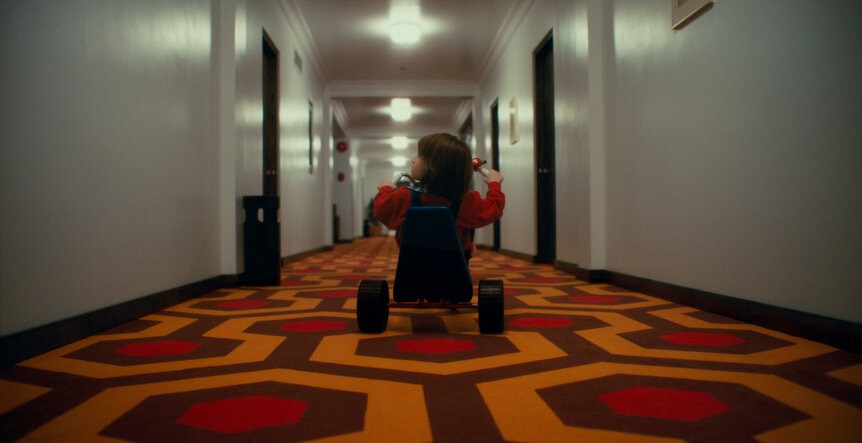Create a free profile to get unlimited access to exclusive videos, sweepstakes, and more!
Doctor Sleep director Mike Flanagan explains how that big third-act cameo happened

While Doctor Sleep is undoubtedly a sequel to both Stephen King's and Stanley Kubrick's The Shining, as well as an adaptation of King's novel of the same name, much of the film's third act's visuals belongs to Kubrick. Doctor Sleep's filmmakers painstakingly recreated every inch of the now-abandoned Overlook Hotel onscreen — broke out the carpet, digitally rendered an avalanche of blood, and gave us another look at The Gold Room.
**Spoiler Warning: There are spoilers for Doctor Sleep below**
So the finale may look like Kubrick's world, but, at its heart, it's all King. While King has a famously contentious relationship with Kubrick's 1980 onscreen interpretation (he hates it), he was willing to play ball with Mike Flanagan because the writer-director seemed to understand the themes of his original story so well. The real kicker was Flanagan's pitch about how he'd include and handle a back-and-forth between a now-grown Dan Torrance (Ewan McGregor) and his father Jack Torrance's ghost.
"That scene is the reason Stephen King let us go back to the Overlook," Flanagan told SYFY WIRE. "That was the pitch. And so once he had given us his blessing to bring the hotel back into it, it was clear that we were going to have to do this Jack and Dan scene. It was the reason I wanted to make the movie."
The contemplative scene that Flanagan pitched kicks off the third act's ax-swinging, Shine-battle showdown, with Dan picking his way through the dilapidated Overlook to "wake it up." As he wanders down cobweb-covered halls and darts around every corner, jaw clenched, he doesn't find much of anything to fear. It's just the eery, now-silent ghosts he once grappled with there. That is until he reaches the Gold Room and the bar that his father Jack so infamously sat at to have a late-night drink — as well as a chat with Lloyd the bartender.
In a shot so painfully like that in Kubrick's The Shining, Dan takes a seat where his father had once perched to drown his sorrows. He waits in silence for a moment, seemingly alone, before a man sets a glass in front of him and pours out a healthy amount of whiskey. McGregor's Dan, who audiences have seen beat back his own addiction up to this point, delivers an emotional monologue to the faceless bartender about that addiction and the legacy of familial pain.
It's only when the camera shifts that the audience sees the bartender isn't Lloyd as expected but Jack, who's been absorbed by the hotel for its own psychologically manipulative purposes. He's quieter and wearing Lloyd's getup, but is still unmistakably Jack Torrance, especially as he starts delivering familiar lines ("take your medicine") and sneering at his son. Dan has just unloaded decades of what he could never say to his father in one fell swoop.
Up to this point in the movie, Jack, famously portrayed by Jack Nicholson and his eyebrows in The Shining, has been more a specter overshadowing Dan's life than anything else. His inclusion in Doctor Sleep came as a surprise for many fans, especially because the actor portraying Jack was neither Nicholson, who's now 82 years old, nor a CGI rendering of a younger Nicholson, a practice that's become commonplace in recent years.
"The options of how to approach it suddenly popped up. And the first one was the digital one," Flanagan explains. "And I felt like that was going to be really distracting — it always is. There's something wrong. It's uncanny. And it always rips me out of the story. It makes me think about the tech — 'Oh, they figured out this but not the eyes…'
"And that meant, if we were going to be consistent, we would have had to do that with Wendy, and young Danny, and Mrs. Massey, and Dick Hallorann, and then I'm just making a video game. So I didn't want to do that."
So Flanagan set out to find actors who he says reminded him of the original performers, but who were still doing their own thing. He didn't want the actors to be doing an impression or a parody. "And with Jack that was critical," Flanagan says. "Because a Jack Nicholson impression? It would be fatal. Especially at the height of his Jackness toward the end of The Shining."
The true solution to how to reintroduce Jack to the narrative came from how Kubrick had handled the ghost of Delbert Grady in The Shining. "Jack says, 'You're Delbert Grady, you killed your family!' and [Delbert] says, 'No, you've mistaken me for someone else. I'm just a waiter,'" Flanagan explains. That was his "ah-ha!" moment; it all came together.
"I said, 'What if it's not Jack? What if it's Lloyd?' What if Jack, having been digested by the hotel, is 'just a bartender?' Because then we're not trying to find someone who can do Jack Nicholson. Now we're talking about playing Lloyd the bartender, and for just little moments, let a little bit of Jack Torrance out. Just in tiny bursts."
The man for the job turned out to be Henry Thomas, Flanagan's friend and an actor he'd worked with on The Haunting of Hill House and Gerald's Game. Flanagan called Thomas and offered him one of two roles: either that of Dan's best friend Billy Freeman (a role that Cliff Curtis would eventually fill) or that of Jack Torrance.
"I said, 'It's one day of shooting and every move you make will be under intense scrutiny; half the audience will hate it. Guaranteed,'" Flanagan says. "And he was appropriately terrified by that and thought it over for a day and called me back and said 'If you're gonna step into the crosshairs, you're gonna be compared to Kubrick — you're never going to win. So how about I go with you and we can live or die together?'"
And so Thomas became Jack Torrance. Or, at least, he became the shadow of Jack Torrance, a blurry facsimile meant to break down Dan's defenses so the Overlook could claim yet another soul. That Jack and Dan's conversation went down over a drink, the one thing that Dan always felt connected him to his father above all else and the thing he'd left behind out of self-preservation, was the only way it could have worked.
"That opened up the hotel. That let us go back to the Kubrick hotel," Flanagan concludes. "I think [King] was interested in what that conversation would be. And because it was so rooted in recovery and so rooted in the language of recovery and addiction, that [it] was all over a drink. I think that was attractive to him."



























